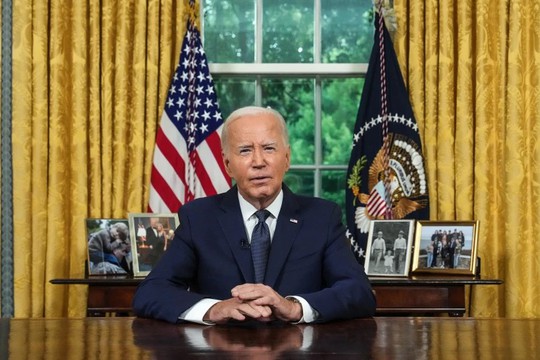Photo: The White House
Biden addressed the nation from the Oval Office. The president, in his 12-minute address, embraced a legacy as the bridge-builder he vowed he would be four years ago. But the speech also came at a moment when the party — and the nation’s political discourse — has already moved on, transfixed for the moment with Harris, who has taken the baton and run with it in a way Biden no longer could, writes POLITICO.
In a way, not seeking a second term may be the most broadly popular decision Biden has made as president. A CNN/ORC poll on Wednesday showed that 87 percent of all registered voters approved of his decision to end his campaign.
Speaking for the first time about his historic decision to end his reelection bid, President Joe Biden said that “saving our democracy” was “more important than any title.”
During an Oval Office address, Biden told the country that his painstaking choice to step aside, which only came after weeks of pressure from fellow Democrats, was made with the good of his party and country in mind.
“I believe my record as president, my leadership in the world, my vision for America’s future all merited a second term. But nothing — nothing — can come in the way of saving our democracy, and that includes personal ambition,” Biden said. “The best way forward is to pass the torch to a new generation. That is the best way to unite our nation.”
Magnanimous and optimistic in tone as he spoke from behind the Resolute Desk, Biden spoke both to history and the present moment, attempting to push back on critics who say he must resign the office now and to salvage a legacy that could be deeply tarnished by the events of the last month.
The president, at 81 the oldest person to hold the office, did not explicitly say that he quit because of his health or polls showing him likely to lose, acknowledging only that he stepped aside “to unite my party.”
He presented himself as a truth-teller, a response to weeks of questions about whether he and aides had concealed the truth about his health and growing frailty as they sought another four-year term. “When I was elected, I promised to always level with you, to tell you the truth,” Biden said.
Unlike Lyndon B. Johnson’s announcement in March 1968 that he would not seek a second term, the last time a president did so, Biden’s address lacked any real element of surprise. But the speech marked the president’s first spoken words on his decision to call off his reelection campaign since he posted the news on X on Sunday, while he was still isolating at his home on the Delaware shore after testing positive for Covid-19.
The prime-time address aimed to offer a deeper, more personal explanation to the country than his initial written letter, as well as a rallying call of support for Vice President Kamala Harris, his replacement as the Democratic nominee, and their shared legacy.
“There’s a time and place for new voices, fresh voices — yes, younger voices. And that time and place is now,” he added, tapping the Resolute Desk to punctuate the sentence.
He ticked off a number of accomplishments, including having no American troops in conflict zones, as well as his priorities for the remainder of his term, including pushing for his cancer “moonshot” and reforms of the Supreme Court.
“Over the next six months I will be focused on doing my job as president,” he said. “That means I will continue to lower costs for hard-working families and grow our economy. I will keep defending our personal freedoms and our civil rights — from the right to vote — to the right to choose.”
While Biden framed his decision as an instance of a politician putting his country above his own ambition, the last three-plus weeks made clear that he had wanted to remain in the race. He only became the transitional figure he promised he’d be in 2020 after his path to victory in 2024 collapsed following his disastrous June 27 debate performance and the ensuing calls from dozens of Democrats for a new nominee.
Biden did not mention Trump by name. But as he has done for more than a year, he spoke again about the coming election as “an inflection point.” His concluding words carried a valedictory air, and a final challenge for the American people.
read more in our Telegram-channel https://t.me/The_International_Affairs

 11:45 25.07.2024 •
11:45 25.07.2024 •























